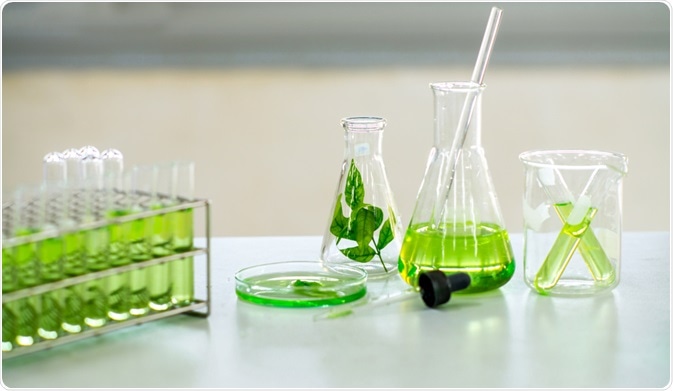Vaccines hold a key place in reducing the global burden of infectious diseases. Global vaccination campaigns have been instrumental in eradicating diseases such as smallpox, measles, and poliomyelitis from major parts of the world and have ultimately saved the lives of millions.

Image Credit: DW2630 / Shutterstock.com
Conventional vaccines
The conventional method of vaccine preparation involves the use of an attenuated or killed/inactivated pathogen or part of the pathogen. Such vaccines, when administered in humans, induce an immune response and offer protection from the disease.
However, these vaccines have the risk of being contaminated with adventitious agents. To this end, the World Health Organization (WHO) defines adventitious agents as “microorganisms that may have been unintentionally introduced into the manufacturing process of a biological medicinal product.”
The challenges associated with traditional vaccines have led to the development of new methods of vaccine development, such as plant-derived vaccines. Through this approach, vaccine antigens are produced in genetically modified plants that are subsequently extracted and purified by various chemical methods.
History
In 1989, a group of researchers led by A. Hiatt first developed plant-derived vaccines at The Scripps Research Institute in La Jolla, California. About 10 years later in 1998, the National Institute of Allergic and Infectious Diseases (NIAID) certified that plant-derived vaccines could produce sufficient immune response.
In 2006, the first plant-derived vaccine was approved by the United States Department of Agriculture. This vaccine, which was approved for protecting poultry against the Newcastle disease virus (NDV), remains the only plant-derived vaccine approved for use in the United States.
How are plant-derived vaccines produced?
Plant-derived vaccines are produced by recombinant technology, in which the gene encoding the desired antigen protein is integrated into the plant genome. Agrobacterium tumefaciens is commonly used for gene transfer and transformation.
As technology continues to advance, novel methods for transformation such as sonication, biolistic bombardment, PEG-mediated, and electroporation, are also being used.
Advantages
Vaccines produced from plants are associated with several advantages, some of which include:
- Cost-effective to produce in large quantities.
- Antigens derived from plants such as potatoes and corn are stable and have a high shelf-life.
- Low probability of adverse effects due to contamination caused by a plant virus.
- Do not require sophisticated storage
- Can be handled easily
- Can be administered orally or delivered through the mucosal route, thus eliminating the need for needles.
Challenges
Despite their advantages, the development of plant-derived vaccines is also associated with several challenges. Some of the major challenges associated with the production of these vaccines include selecting the antigen and plant expression systems, maintaining dosage consistency, and ensuring that all manufacturing processes abide by the Good Manufacturing Practice (GMP) guidelines.
Antigen and plant expression systems
Selection of the antigen and the best expression system or host is a critical step in vaccine development, as not all antigens are compatible with the selected host plants. Optimum selection of expression systems can help ensure the safety of the vaccines while also increasing their thermal stability.
Maintaining dosage consistency
With plant-based vaccines, the dosage may differ within the plants of the same species. The difference may occur from generation to generation, as the size and ripeness of the fruits or plants change.
GPA and GMP guidelines
For quality management, manufacturers of plant-based vaccines must abide by Good Agricultural Practices (GAP) and GMP guidelines. To do this, the manufacturing sites need to be well equipped to accomplish the entire processing cycles of the plant vaccines.
The site also needs to be designed appropriately to ensure that the operations run smoothly. Furthermore, producing plant-based vaccines requires skilled and trained staff to run the various manufacturing processes efficiently.
Future potential
Plant-based vaccines are a novel class of vaccines that have great potential to treat diseases.
Though the development procedure has advanced considerably, there remains a need for more suitable gene delivery methods to achieve efficient and optimum vaccine production.
Several bioethical concerns surrounding the production of plant-based vaccines, such as the risk of transferring allergens from transgenic plants to humans and animals, are also important to consider. Additionally, various technical challenges, such as the development of regulatory requirements, must be addressed before these vaccines can be produced on a large scale.
References
- Plant-derived vaccines [Online]. Available at: https://www.who.int/teams/health-product-policy-and-standards/standards-and-specifications/vaccine-standardization/plant-derived-vaccines
- Takeyama, N., Kiyono, H., & Yuki, Y. (2015). Plant-based vaccines for animals and humans: recent advances in technology and clinical trials. Therapeutic advances in vaccines, 3(5-6), 139–154. doi:10.1177/2051013615613272.
- Laere, E., et al. 2016. "Plant-Based Vaccines: Production and Challenges", Journal of Botany, vol. 2016, Article ID 4928637, 11 pages.
Further Reading
Last Updated: Feb 16, 2023